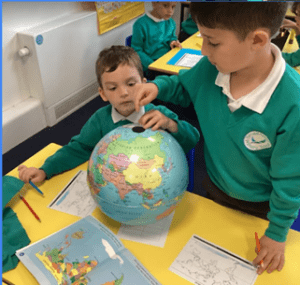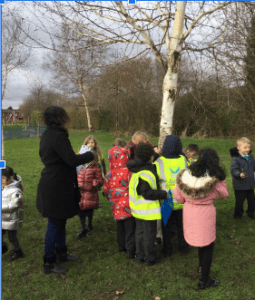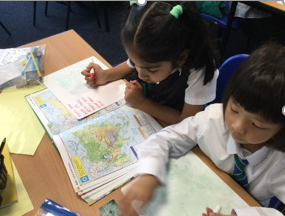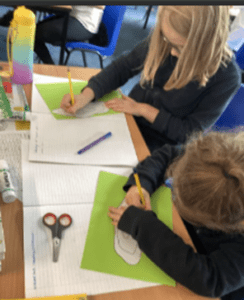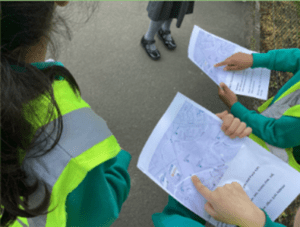Geography
Geography at Broadheath
“An understanding of the natural world and what’s in it is a source of not only a great curiosity but great fulfillment.”
David Attenborough
Intent
The intent of our Geography curriculum at Broadheath Primary School is to Inspire our pupils interest in the World around them, develop their understanding and practise the skills needed in the subject and help pupils to Succeed in their journey towards becoming a successful and inquisitive life long Geographer:
- Develop a sound knowledge of Place within a global context including comparison of locations, places and geographical features via good quality resources and experiences.
- Understand the Environmental conditions, processes and interactions that explain the geographical features and changes over time and human impact on our World.
- To be curious in geographical enquiry and confident in the of skills in observing, collecting, analysing, evaluating and communicating geographical information through practical activities and regular fieldwork opportunities.
Implementation
Our Geography curriculum has been thoughtfully planned and structured to provide progression throughout our learners journey through Broadheath Primary School. In Nursery and EYFS children will learn about their immediate surroundings through practical learning and exploration of their local environment. Each year, learning will cover a growing area, from our local area, to a local, regional then global context. This understanding will build on the firm foundations of their prior knowledge and pupils will develop their understanding of geographical concepts, skills and vocabulary. As pupils progress they will begin to make connections between concepts taught and apply this understanding to their understanding of place, the environmental impact of humans on their planet and their own role in making lifelong sustainable choices.
Within our teaching at Broadheath Primary School we apply Adaptive Practices to enable all learners to achieve their full potential and are accessible for all. These include ensuring that activities are communication friendly for all, there is pre-teaching of new vocabulary for those with Special Needs, activities are broken down into chunks to help build understanding and real life connections are made.
Impact
- Broadheath pupils will be confident at locating places on a range of maps, globes, atlases and using digital sources of information and understand scale.
- Pupils will make comparisons between their own locality and many different geographical regions and describe aspects of geographical similarities and differences.
- They will have a deep understanding of human impact on the globe and discuss their own role in this.
- Develop skills in fieldwork, building on prior skills and analyse data from a range of sources.
- Understand and describe a range of locations using accurate geographical vocabulary and make links between these.
Cultural Capital
The Geography curriculum at Broadheath Primary School provides opportunities for the pupils to learn about a range of places across the globe which acknowledges their own experiences and builds on this as they progress through our school. They will explore local environments such as woodlands and pupils will have the opportunity to visit contrasting localities to their own, for example the coast and the Peak District National Park. On their learning journey, they will have the opportunity to find out more about the rich cultural diversity of our planet and recognise the need to value and cherish this.
‘Geography is the subject that holds the key to our future’. (Michael Palin)
Mathematics at Broadheath
“Mathematics is, within its own way, the poetry of logical ideas.”
Albert Einstein
Our intent
At Broadheath Primary School, we encourage children to have a growth mindset and to think like mathematicians to allow them to Believe, Practise, Succeed. Children are provided with the opportunity to become independent learners who are not afraid of making mistakes. We pride ourselves on engaging children and providing them with a powerful set of tools (including reasoning and problem-solving) to become fantastic mathematicians.
Mathematics is a key life skill, integral to all aspects of life and, at Broadheath Primary, we endeavour to ensure that children develop a healthy and enthusiastic attitude to mathematics, which will remain with them for the rest of their lives.
We use adaptive practice to ensure that our maths curriculum is accessible to all and provide children with the resources and tools they need to achieve their goals. In addition, lessons provide children with the opportunity to explore and investigate.
In order to become mathematicians, children at Broadheath will initially build up their understanding of number and place values before developing their skills. As they progress through school, they develop their fluency in all four operations in addition to increasing their understanding of reasoning and problem solving.
How we Implement our Maths curriculum
The National Curriculum (updated in 2014) prescribes what must be taught in each key stage and year group. We follow the National Curriculum, using a range of resources, including the White Rose maths hub reasoning and problem-solving materials. Learning objectives are adapted to meet the needs of pupils in individual classes by their class teacher.
Our pupils will develop an understanding of:
- Number value, including place value and where numbers fit into the number system
- Number bonds, multiplication tables, doubles and halves
- Mental calculation strategies
- A range of formal calculation methods for all operations, increasing in formality and complexity as they progress through school
- Number problems and how to recognise the operations required to solve them
- The use of reasoning to explain methods using correct mathematical vocabulary
- Whether an answer is reasonable and the strategies for checking such answers where appropriate
- The use of measures, including metric, imperial and non-standard
- How information can be presented and be interpreted
- How to manipulate and construct a range of graphs, diagrams, charts and tables
- Spatial awareness and the properties of 2D and 3D shapes.
Maths lessons in Key Stages 1 and 2 take place daily and provide opportunities for individual, paired, group and class activities as well as exploiting cross-curricular links to other subjects. In Nursery, focussed maths activities take place once or twice a week and in Reception maths is taught daily in addition to continuous provision activities to give them an opportunity to apply their learning.
We set work which is challenging, motivating and encourages children to take responsibility for their own learning. Children have access to a wide range of resources to support their learning including: base 10, tens frames, numicon, number lines and multiplication square. Across the school, our daily maths lesson includes a “fix-it”, “revisit-it” and “push-it”:
- Fix-it – any child with misconceptions from the previous lesson is corrected with the class teacher.
- Revisit-it – extra examples from the previous lesson to consolidate understanding.
- Push-it – an extra challenge – usually much harder – for those children who have a firm grasp of the objectives from the previous lesson.
The Impact of our Maths curriculum
As mathematicians at Broadheath Primary School, our children will be able to:
- Confidently calculate a variety of fluency questions using all four operations (addition, subtraction, multiplication and division).
- Be able to apply their knowledge to a wide variety of reasoning, problem-solving questions and real-life scenarios. I
- Be able to justify and articulate their understanding working through challenging concepts logically and methodically both collaboratively and independently.
Cultural Capital
At Broadheath Primary School, we encourage children to challenge themselves and think about maths like a mathematician drawing upon their prior learning and applying the skills they have developed. To provide children with the opportunity to develop their mathematical skills further, here are some examples of experiences they made be involved in:
- Explore maths using a variety of methods including practical investigations
- Supported with the preparation of the year 4 MTC and KS2 SATs
- Home and school links are encouraged through parental workshops and parent-teacher meetings.
- Opportunities to participate in external competitions for example the First Maths Challenge and Primary Maths Challenge
- International maths day
- Participation in our tailor made Financial literacy project
- Workshops facilitated by corporate business volunteers to develop an understanding of maths in the wider world

